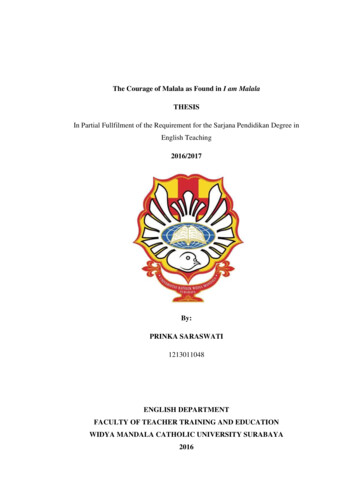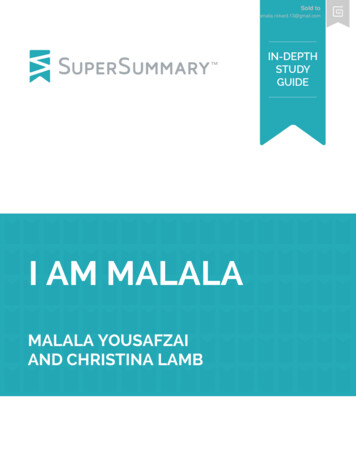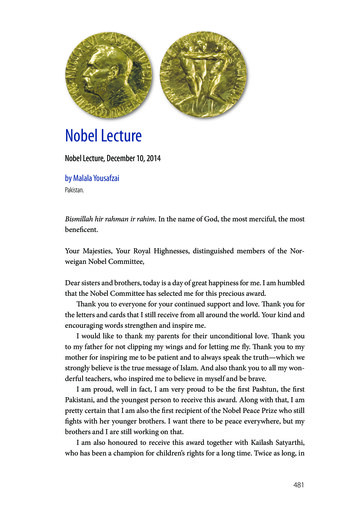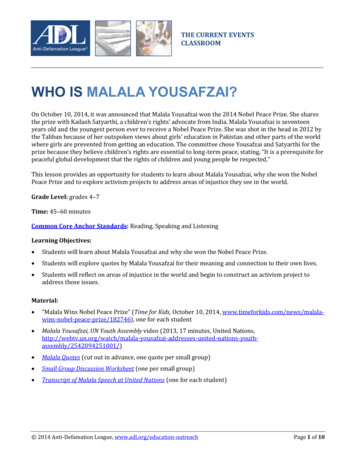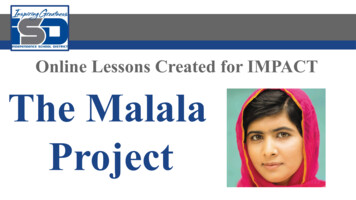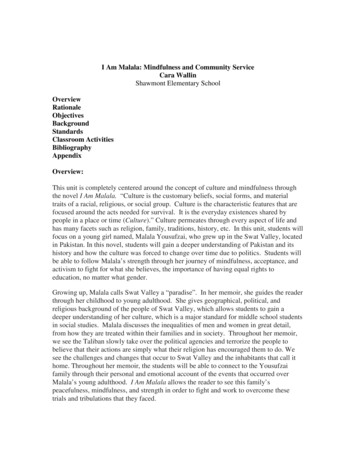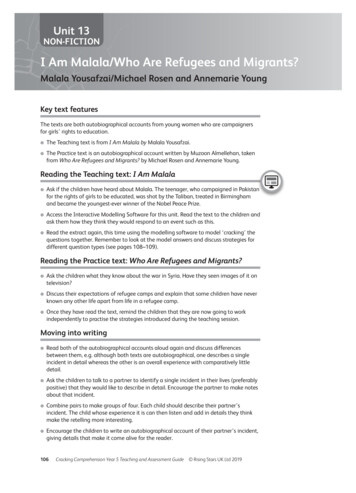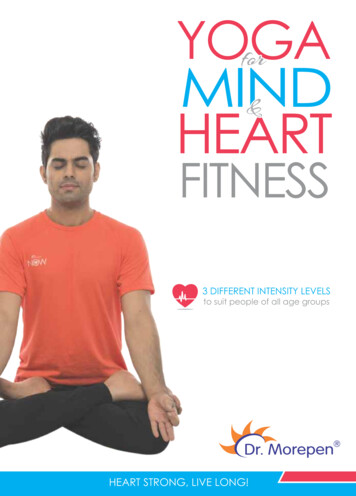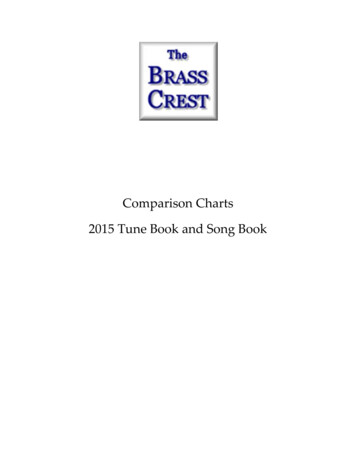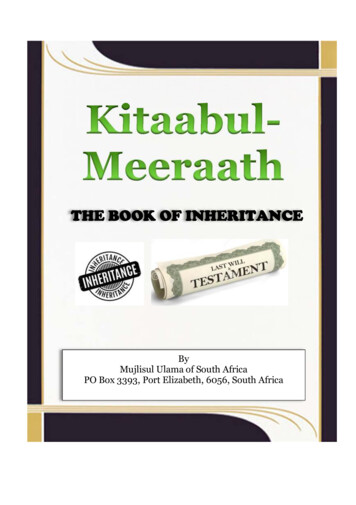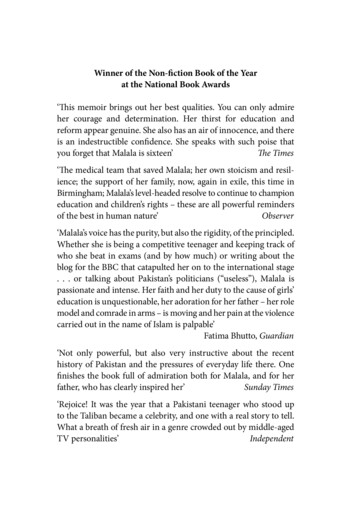
Transcription
Winner of the Non-fiction Book of the Yearat the National Book Awards‘This memoir brings out her best qualities. You can only admireher courage and determination. Her thirst for education andreform appear genuine. She also has an air of innocence, and thereis an indestructible confidence. She speaks with such poise thatyou forget that Malala is sixteen’The Times‘The medical team that saved Malala; her own stoicism and resilience; the support of her family, now, again in exile, this time inBirmingham; Malala’s level-headed resolve to continue to championeducation and children’s rights – these are all powerful remindersof the best in human nature’Observer‘Malala’s voice has the purity, but also the rigidity, of the principled.Whether she is being a competitive teenager and keeping track ofwho she beat in exams (and by how much) or writing about theblog for the BBC that catapulted her on to the international stage. . . or talking about Pakistan’s politicians (“useless”), Malala ispassionate and intense. Her faith and her duty to the cause of girls’education is unquestionable, her adoration for her father – her rolemodel and comrade in arms – is moving and her pain at the violencecarried out in the name of Islam is palpable’Fatima Bhutto, Guardian‘Not only powerful, but also very instructive about the recenthistory of Pakistan and the pressures of everyday life there. Onefinishes the book full of admiration both for Malala, and for herfather, who has clearly inspired her’Sunday Times‘Rejoice! It was the year that a Pakistani teenager who stood upto the Taliban became a celebrity, and one with a real story to tell.What a breath of fresh air in a genre crowded out by middle-agedTV personalities’IndependentMalala mmp prelims film tie in ppi-xiv [V4].indd 314/08/2015 10:58
‘Malala is an inspiration to girls and women all over the world’J.K. Rowling‘[Malala] is now an inspirational symbol both of defiance and ofthe love of learning . . . Her story is astonishing’Spectator‘Malala Yousafzai’s story begins with her parents being commiserated with after producing a baby girl. In their part of northernPakistan, she says, rifle shots ring out in celebration of a baby boy’sarrival. But there is no such fanfare for females: their destiny isto cook and clean, to be neither seen nor heard . . . So how didMalala, who barely warranted a mention in her family’s genealogy,become destined for the history books as a powerful symbol forgirls’ universal right to an education? Her memoir I Am Malalatells us how ’Baroness Warsi, Daily Telegraph‘Part memoir, part mission statement. I Am Malala recounts theearly life of Malala Yousafzai, the Pakistani schoolgirl who spokeout against the Taliban and was shot for her defiance. Her recovery, bravery and stoicism – and her father, Ziauddin – make forshocking and moving reading’Emerald Street‘The story of the girl shot by the Taliban for speaking up forwomen’s education is one of idealism and stubborn courage, and areminder that women’s rights and many children’s rights to education are continually threatened’Metro‘Honest, insightful and piercingly wise, this is the celebrity memoir to give your teenaged daughter’Independent on Sunday‘Malala has shown extraordinary courage in campaigning for themillions of girls who are still denied an education. Uplifting andinspirational’Times Higher Education SupplementMalala mmp prelims film tie in ppi-xiv [V4].indd 414/08/2015 10:58
‘She has the heart and courage of a lioness and is a true inspiration’Sun‘The world is entranced by the story of the 15-year-old girl whowas shot in the head by the Taliban because she wished to go toschool. Flown over to Birmingham for emergency surgery, she hasemerged as an elegant and brave spokesgirl for a better future . . .This book should inspire girls the world over’Catholic Herald‘Inspirational and powerful . . . extraordinary’Grazia‘I felt both humbled and inspired by I Am Malala . . . Deftly writtenwith the help of an award-winning foreign correspondent, this is amust-read for anyone seeking to understand the tortured politicsof the Taliban in the North-West Frontier’Tablet‘Ms Yousafzai’s stature as a symbol of peace and bravery has beenestablished across the world’New York Times‘This remarkable book is part memoir, part manifesto. I feelenriched from having read it. I also feel humbled. Our obsessionwith school performance is suddenly marginalised by a story inwhich education, quite literally, proves a matter of life and death’Educational Supplement‘Compelling. It’s a brave girl’s tale in an unsafe country, and itreveals her fierce determination to make the world a better place’Washington Times‘The Pakistani schoolgirl shot by the Taliban has astonished theworld with her courage and determination to fight for educationand equal rights for women’Financial TimesMalala mmp prelims film tie in ppi-xiv [V4].indd 514/08/2015 10:58
Malala Yousafzai, the educational campaigner from Swat Valley,Pakistan, came to public attention by writing for BBC Urdu aboutlife under the Taliban. Using the pen name ‘Gul Makai’, she oftenspoke about her family’s fight for girls’ education in her community.In October 2012, Malala was targeted by the Taliban and shot inthe head as she was returning from school on a bus. She miraculously survived and continues her campaign for education.In recognition of her courage and advocacy, Malala was awardedthe Nobel Peace Prize in 2014, becoming the youngest ever recipient at just seventeen years of age. She was also honoured withthe National Peace Prize in Pakistan in 2011 and the InternationalChildren’s Peace Prize in 2013, and she was shortlisted for TimeMagazine Person of the Year.Malala continues to champion universal access to educationthrough the Malala Fund, a non-profit organisation investing incommunity-led education programmes and supporting educationadvocates around the world.www.malala.orgChristina Lamb is one of the world’s leading foreign correspondents. She has reported on Pakistan and Afghanistan since 1987.Educated at Oxford and Harvard, she is the author of five booksand has won a string of awards, including Britain’s Foreign Correspondent of the Year five times as well as the Prix Bayeux, Europe’smost prestigious award for war correspondents. She currentlyworks for the Sunday Times and lives between London and Portugal with her husband and son.Malala mmp prelims film tie in ppi-xiv [V4].indd 614/08/2015 10:58
Henna decorations of calculus and chemical formulae on Malala’s hand,instead of the traditional flowers and butterfliesMalala mmp prelims film tie in ppi-xiv [V4].indd 714/08/2015 10:58
The Girl Who Stood Up for Educationand Was Shot by the TalibanMalala Yousafzaiwith Christina LambMalala mmp prelims film tie in ppi-xiv [V4].indd 914/08/2015 10:58
A W&N PAPERBACKFirst published in Great Britain in 2013by Weidenfeld & NicolsonThis edition published in 2015by Weidenfeld & Nicolsonan imprint of Orion Books Ltd,Carmelite House, 50 Victoria Embankment,London ec4Y 0dzAn Hachette UK company1 3 5 7 9 10 8 6 4 2Copyright Salarzai Limited 2013Map John Gilkes 2013The right of Malala Yousafzai to be identified as the author of this workhas been asserted by her in accordance with the Copyright, Designs andPatents Act 1988.All rights reserved. No part of this publication may be reproduced,stored in a retrieval system, or transmitted, in any form or by anymeans, electronic, mechanical, photocopying, recording orotherwise, without the prior permission of the copyright owner.For additional copyright information, please turn to page 291.The author and the publisher have made every effort to ensure that theinformation in this book is correct. The events, locales and conversationsare based on the author’s memories of them, and any errors that mayappear in the book are unintentional. Some names and identifyingdetails have been changed to protect the privacy of individuals.Every effort has been made to fulfil requirements with regard toreproducing copyright material. The author and publisher will beglad to rectify any omissions at the earliest opportunity.A CIP catalogue record for this bookis available from the British Library.isbn 978-1-4746-0211-2Npgl rcb l b ms l b gl ? s qrp jg wE pgddgl NpcqqThe Orion Publishing Group’s policy is to use papers that are natural,renewable and recyclable products and made from wood grown insustainable forests. The logging and manufacturing processes are expectedto conform to the environmental regulations of the country of origin.www.orionbooks.co.ukMalala mmp prelims film tie in ppi-xiv [V4].indd 1014/08/2015 10:58
AFGHAN20 kmsMap of Swat, Pakistan, andsurrounding RJIKarshatBarkanaShahpurKISTCHINAANImam Deri(Fazlullah’s HQ)MalakandLine of controlKabulTora indiAFGHANISTANWAZIRISTANKandaharLahoreQuettaP A K I S T A NINDIAIRANNKarachi0A R A B I A NS E AMalala mmp prelims film tie in ppi-xiv [V4].indd 110100200200300 miles400 kms14/08/2015 10:58
To all the girls who have faced injustice and been silenced.Together we will be heard.Malala mmp prelims film tie in ppi-xiv [V4].indd 1314/08/2015 10:58
ContentsPrefacePrologue: The Day My World Changedxvii1Part One: before the taliban12345A Daughter Is BornMy Father the FalconGrowing Up in a SchoolThe VillageWhy I Don’t Wear Earrings andPashtuns Don’t Say Thank You6 Children of the Rubbish Mountain7 The Mufti Who Tried to Close Our School8 The Autumn of the Earthquake921324756657484Part Two: The Valley of Death9101112131415Radio MullahToffees, Tennis Balls and the Buddhas of SwatThe Clever ClassThe Bloody SquareThe Diary of Gul MakaiA Funny Kind of PeaceLeaving the Valley91102112123129138147Part Three: three girls, three bullets16 The Valley of Sorrows17 Praying to Be TallMalala R ppxv-xxiv new page nos (b) [V4].indd 1515717114/08/2015 11:13
18 The Woman and the Sea19 A Private Talibanisation20 Who Is Malala?183190198Part Four: between life and death21 ‘God, I entrust her to you’22 Journey into the Unknown207220Part Five: A Second Life23 ‘The Girl Shot in the Head, Birmingham’24 ‘They have snatched her smile’Epilogue: One Child, One Teacher, One Book,One Pen . . .GlossaryAcknowledgementsImportant Events in Pakistan and SwatMalala Yousafzai interviewed by her US editor,Judy ClainFor DiscussionAdditional Credits and ThanksA Note on the Malala FundMalala R ppxv-xxiv new page nos (b) [V4].indd 1623124525626727127527728929129314/08/2015 11:13
PrefaceA year has passed since my book came out, and two years since theOctober morning when I was shot by the Taliban on a school buson my way home from class. My family has been through manychanges. We were plucked from our mountain valley in Swat, Pakistan, and transported to a brick house in Birmingham, England’ssecond biggest city. Sometimes it seems so strange that I want topinch myself. I’m 17 now and one thing that has not changed is thatI still don’t like getting up in the morning. The most astonishingthing is that it’s my father whose voice wakes me up now. He getsup first every day and prepares breakfast for me, my mother andmy brothers Atal and Kushal. He doesn’t let his work go unnoticed,of course, going on about how he squeezes fresh juice, fries eggs,heats flat bread and takes the honey out of the cupboard. ‘It’s onlybreakfast!’ I tease. For the first time in his life, he also does the shopping, although he hates doing it. The man who didn’t even know theprice of a pint of milk is such a frequent visitor to the supermarketthat he knows where everything is on the shelves! ‘I’ve become likea woman, a true feminist!’ he says, and I jokingly throw things athim.My brothers and I then all rush off to our different schools. Andso does our mother, Toor Pekai, which truly is one of the biggestchanges of all. She is attending a language centre five days a weekto learn how to read and write, and also to speak English. Mymother had no education and perhaps that was the reason that shealways encouraged us to go to school. ‘Don’t wake up like me andrealise what you missed years later,’ she says. She faces so manyproblems in her daily life, because up until now she’s had difficultycommunicating when she’s gone shopping, or to the doctor, or thexviiMalala R ppxv-xxiv new page nos (b) [V4].indd 1714/08/2015 11:13
i am malalabank. Getting an education is helping her become more confident,so that she can speak up outside the home, not just inside it with us.A year ago I thought we would never be settled here, but nowBirmingham has started to feel like home. It will never be Swat,which I miss every day, but these days, when I travel to other placesand return to this new house, it does feel like home. I have evenstopped thinking about the constant rain, although I laugh whenmy friends here complain about the heat when it’s 68 or 77 degreesFahrenheit. To me, that feels like spring. I am making friends at mynew school, although Moniba is still my best friend and we Skypefor hours at a time to catch up on everything. When she talks aboutthe parties back in Swat, I so wish I were there. Sometimes I talk toShazia and Kainat, the other two girls who were shot on the bus andare now at Atlantic College in Wales. It is hard for them being so faraway and in such a different culture, but they know they have a greatopportunity to fulfil their dreams of helping their communities.The school system here is very different from the one we hadin Pakistan. In my old school, I was considered ‘the smart girl’. Ihad this idea that I would always be the smartest one and that ifI worked hard or not, I would always come first. Here in the UK,the teachers expect more from their students. In Pakistan, we usedto write long answers. You really could write anything you liked;sometimes the examiners would get tired and give up reading partof the way through but still give you high marks! In England, thequestions are often longer than the answers. Perhaps the expectations in Pakistan were lower because it was so challenging just to bein school. We didn’t have good science labs, computers or libraries.All we had was a teacher with a white board standing in front of thestudents and their books. Back home I was considered a bookishgirl because I had read eight or nine books. But when I came to theUK I met girls who had read hundreds of books. Now I realise I’veread hardly anything at all and I want to read all those hundreds ofbooks. Next year I’ll do my GCSEs and then I will do my A levelsand hope to go to university to study politics and philosophy.xviiiMalala R ppxv-xxiv new page nos (b) [V4].indd 1814/08/2015 11:13
Malala YousafzaiI’m still hopeful that I can return to Swat and see my friends,my teachers, my school and my house again. Perhaps it will taketime, but I’m sure it will be possible one day. My dream is toreturn to the country where I was born and serve the people. Idream that one day I will be an influential politician in Pakistan.Sadly, Maulana Fazlullah, the man who was the head of the SwatTaliban who shot me, is now the head of the whole Pakistan Taliban. That has made it even riskier for me to return to Pakistan.But even if there were no threat, I believe that I must get an education to strengthen myself for the fight I will surely have againstignorance and terrorism. My plan is to learn more about history,to meet interesting people and listen to their opinions.I’m very busy with school and events, but I have made friendsand we chat in our breaks and lunchtime. They like to talk aboutsport, while I like reading Time and the Economist. Anyway, wedon’t have much time – school here is a lot of work!Thanks to the extraordinary doctors here, my health is good.When I first got out of hospital, I had physiotherapy once aweek to help me heal, and I needed a lot of support. The doctorssay that my facial nerve is now recovered up to 96 per cent. Thecochlear implant has helped my hearing and the doctors say that inthe future they may come up with newer, even better technology. Idon’t get headaches any more and I do sports, though people stilltake care not to throw a ball near my head! I’m fairly good in somesports, like rounders and cricket, though of course my brothersdisagree.My brothers have settled in, though I fight with Kushal as muchas ever. Atal makes us all laugh. He uses very dramatic languageand is so full of energy that he makes us all tired.Recently we had a fight because he took an iPod that had beengiven to me. ‘Malala, I have taken it as I know you already have two.’I said, ‘The thing is, you can’t take something without permission.’Atal is very good at spontaneous tears, so he started crying. ‘Ineed something to enjoy my life,’ he wailed. ‘I’m living in this housexixMalala R ppxv-xxiv new page nos (b) [V4].indd 1914/08/2015 11:13
i am malalaand it’s like a prison. Malala, people call you the bravest girl in theworld, but I say you are the cruellest girl in the world! You broughtus here and you can’t even give me an iPod!’Many of our friends back in Pakistan probably think we arevery lucky to live in England in a nice brick house and go to goodschools. My father is education attaché for the Pakistan consulateand an adviser for global education for the UN. It would be a dreamlife for many young, ambitious Pakistanis. But when you are exiledfrom your homeland, where your fathers and forefathers wereborn and where you have centuries of history, it’s very painful. Youcan no longer touch the soil or hear the sweet sound of the rivers.Fancy hotels and meetings in palaces cannot replace the sense ofhome.I see this so clearly with my mother. Physically she’s in Birmingham, but mentally she’s in Swat – her homesickness is horrible.Sometimes she spends more of her day talking on the phone to herfamily and friends in Swat than she does with us. But recently theRoyal Society of Medicine held a ceremony in London to honourthe doctors who saved my life and my mother sat on stage for thefirst time, which was a really big thing for her.All of us have been overwhelmed by the warm reception we havereceived around the world and the reaction to the book, which hashelped people understand our story.When I get prizes I send the money to Swat to help children goto school or adults buy small businesses, like a shop or a taxi todrive so that they can earn money for their families. We have received many letters, even one from an elderly man in Japan whowrote, ‘I am an old poor man but I want to help,’ and he sent us anote for 10,000 yen without a return address so that we could thankhim.With the Malala Fund, I went to Kenya to build a school for thepeople of Maasai Mara. The people were amazing – tall and proud,wrapped in bright scarlet blankets and telling us stories I couldhardly believe were real. They were even richer than our PashtunxxMalala R ppxv-xxiv new page nos (b) [V4].indd 2014/08/2015 11:13
Malala Yousafzaitales. None of the older Maasai have been educated, but now all thechildren are going to school. It is not easy, as the government onlygives them free education up until grade eight. After that, they haveto pay themselves.The Maasai told us that until recently a boy would be circumcisedand then had to go into the bush to kill two or more lions and bringback the carcasses. The elders would then yank out the boy’s twofront teeth – imagine how painful! – and if he didn’t cry he wouldbecome a Maasai warrior. Today their customs have changed. Theytold us if they kill all the lions the wildlife will disappear, so nowthose who become warriors are those with higher education, notthose who kill lions. They will even have women Maasai warriors.And they have stopped circumcising their women.I spent my seventeenth birthday in Nigeria to show solidaritywith the schoolgirls abducted from their dormitory in the deadof night by Boko Haram militants in April. Those girls were myage and all had dreams of being doctors or teachers or scientists.They were very brave and special girls, as only 4 per cent of girlsin northern Nigeria finish school. The world moves easily on toother issues and I don’t want people to forget. We will have anotherMalala Fund project there.As part of our advocacy work with the Malala Fund, we went tothe White House to meet Barack Obama. We met with Michelle andtheir elder daughter Malia and were given honey from the WhiteHouse bees. Then we visited with Barack Obama in the Oval Office,which was quite small. He came out to receive us. He listened to usvery attentively.When we were invited to the White House we said we wouldaccept the invitation on one condition. If it was just a photo session we would not go, but if Obama would listen to what was inour hearts then we would go. The message came back: you are freeto say whatever you wish. And so we did! It was quite a seriousmeeting. We talked about the importance of education. We discussed the USA’s role in supporting dictatorships and drone attacksxxiMalala R ppxv-xxiv new page nos (b) [V4].indd 2114/08/2015 11:13
i am malalain countries like Pakistan. I told him that instead of focusing oneradicating terrorism through war, he should focus on eradicatingit through education.In the last year, I have worked tirelessly in my role as an education activist, through my organisation the Malala Fund. I havetravelled to the conflict-hit areas to raise awareness about theplight of children who are deprived of an education. I have startedprojects in Jordan, Pakistan, Kenya and Nigeria. I have spoken toworld leaders and encouraged them to raise the education budgetsof their countries and pushed powerful nations to give greater education aid to developing ones. We are growing our work every day,but I know there is so much left to do. I thank God that I have beengiven this platform to campaign for. This is now my life’s work, mymission and my dream.Through the Malala Fund, I decided to campaign for the education of Syrian refugees in Jordan. I went to the Syrian border andwitnessed scores of refugees fleeing into Jordan. They had walkedthrough the desert to get there with just the clothes on their backs.Many children had no shoes. I broke down and cried as I witnessedtheir suffering. In the refugee settlements, most of the childrenwere not going to school. Sometimes there was no school. Sometimes it was unsafe to walk to school. And sometimes children wereworking instead of being educated because their fathers had beenkilled. I saw many children on the roadside in this hot, hot weatherdoing child labour, asking for work such as carrying heavy stonesto feed their families.I just felt such pain in my heart. What is their sin? What havethey done that they’ve had to migrate? Why are these innocent children suffering such hardship? Why are they deprived of school anda peaceful environment?I met a girl called Mizune who was my age. Every day she goesfrom tent to tent trying to persuade people to send their childrento school. She told me that she wants to be a journalist so she canhelp people understand what’s going on. I asked her, ‘If you couldxxiiMalala R ppxv-xxiv new page nos (b) [V4].indd 2214/08/2015 11:13
Malala Yousafzaido anything what would you do?’ and she said, ‘I want to see myhome again and stop these wars.’We spoke to many agencies and raised awareness about the plightof refugees to help increase support for them. We also started projects on the ground with the Malala Fund to help integrate Syrianrefugees into schools in Jordan.I am a refugee, too, forced to live far away from my own country.As my father says, we might be the world’s best-treated refugees,in a nice house with everything we need, but we still yearn for ourhomeland. So much has changed this past year, but really I am thesame old Malala who went to school in Swat. My life has changed,but I have not. If you were to ask my mother she would say, ‘Well,maybe Malala has become wiser, but she’s still the same quarrelsome girl at home whose shirt is in one place, trousers in another,the same messy girl who’s always crying, “I haven’t done my homework!”’ Some things, even if they are small, do stay the same.BirminghamJuly 2014xxiiiMalala R ppxv-xxiv new page nos (b) [V4].indd 2314/08/2015 11:13
prologueThe Day My World ChangedIcome from a country which was created at midnight. WhenI almost died it was just after midday.One year ago I left my home for school and never returned. Iwas shot by a Taliban bullet and was flown out of Pakistan unconscious. Some people say I will never return home but I believefirmly in my heart that I will. To be torn from the country that youlove is not something to wish on anyone.Now, every morning when I open my eyes, I long to see myold room full of my things, my clothes all over the floor andmy school prizes on the shelves. Instead I am in a country which isfive hours behind my beloved homeland Pakistan and my home inthe Swat Valley. But my country is centuries behind this one. Herethere is any convenience you can imagine. Water running fromevery tap, hot or cold as you wish; lights at the flick of a switch,day and night, no need for oil lamps; ovens to cook on that don’tneed anyone to go and fetch gas cylinders from the bazaar. Hereeverything is so modern one can even find food ready cooked inpackets.When I stand in front of my window and look out, I see tall buildings, long roads full of vehicles moving in orderly lines, neat greenhedges and lawns, and tidy pavements to walk on. I close my eyesand for a moment I am back in my valley – the high snow-toppedmountains, green waving fields and fresh blue rivers – and my heartsmiles when it looks at the people of Swat. My mind transports me1Malala R new text file (v3).indd 119/08/2014 15:40
i am malalaback to my school and there I am reunited with my friends andteachers. I meet my best friend Moniba and we sit together, talkingand joking as if I had never left.Then I remember I am in Birmingham, England.The day when everything changed was Tuesday, 9 October 2012. Itwasn’t the best of days to start with as it was the middle of schoolexams, though as a bookish girl I didn’t mind them as much assome of my classmates.That morning we arrived in the narrow mud lane off Haji BabaRoad in our usual procession of brightly painted rickshaws, sputtering diesel fumes, each one crammed with five or six girls. Sincethe time of the Taliban our school has had no sign and the ornamented brass door in a white wall across from the woodcutter’syard gives no hint of what lies beyond.For us girls that doorway was like a magical entrance to ourown special world. As we skipped through, we cast off our headscarves like winds puffing away clouds to make way for the sunthen ran helter-skelter up the steps. At the top of the steps was anopen courtyard with doors to all the classrooms. We dumped ourbackpacks in our rooms then gathered for morning assembly underthe sky, our backs to the mountains as we stood to attention. Onegirl commanded, ‘Assaan bash! ’ or ‘Stand at ease!’ and we clickedour heels and responded, ‘Allah.’ Then she said, ‘Hoo she yar! ’ or‘Attention!’ and we clicked our heels again. ‘Allah.’The school was founded by my father before I was born, andon the wall above us khushal school was painted proudly inred and white letters. We went to school six mornings a week andas a fifteen-year-old in Year 9 my classes were spent chanting chemical equations or studying Urdu grammar; writing stories in Englishwith morals like ‘Haste makes waste’ or drawing diagrams of bloodcirculation – most of my classmates wanted to be doctors. It’s hardto imagine that anyone would see that as a threat. Yet, outside thedoor to the school lay not only the noise and craziness of Mingora,2Malala R new text file (v3).indd 219/08/2014 15:40
Malala Yousafzaithe main city of Swat, but also those like the Taliban who think girlsshould not go to school.That morning had begun like any other, though a little laterthan usual. It was exam time so school started at nine insteadof eight, which was good as I don’t like getting up and can sleepthrough the crows of the cocks and the prayer calls of the muezzin.First my father would try to rouse me. ‘Time to get up, Jani mun,’ hewould say. This means ‘soulmate’ in Persian, and he always calledme that at the start of the day. ‘A few more minutes, Aba, please,’ I’dbeg, then burrow deeper under the quilt. Then my mother wouldcome. ‘Pisho,’ she would call. This means ‘cat’ and is her name for me.At this point I’d realise the time and shout, ‘Bhabi, I’m late!’ In ourculture, every man is your ‘brother’ and every woman your ‘sister’.That’s how we think of each other. When my father first broughthis wife to school, all the teachers referred to her as ‘my brother’swife’ or Bhabi. That’s how it stayed from then on. We all call herBhabi now.I slept in the long room at the front of our house, and the onlyfurniture was a bed and a cabinet which I had bought with someof the money I had been given as an award for campaigning forpeace in our valley and the right for girls to go to school. On someshelves were all the gold-coloured plastic cups and trophies I hadwon for coming first in my class. Only a few times had I not cometop – each time I was beaten by my class rival Malka e-Noor. I wasdetermined it would not happen again.The school was not far from my home and I used to walk, butsince the start of last year I had been going with other girls by bus.It was a journey of just five minutes along the stinky stream, past thegiant billboard for Dr Humayun’s Hair Transplant Institute wherewe joked that one of our bald male teachers must have gone whenhe suddenly started to sprout hair. I liked the bus because I didn’tget as sweaty as when I walked, and I could chat with my friendsand gossip with Usman Ali, the driver, who we called Bhai Jan, or‘Brother’. He made us
I Am Malala recounts the early life of Malala Yousafzai, the Pakistani schoolgirl who spoke out against the Taliban and was shot for her de"ance. Her recov-ery, bravery and stoicism – and her father, Ziauddin – make for shocking and moving reading’ Emerald Street
